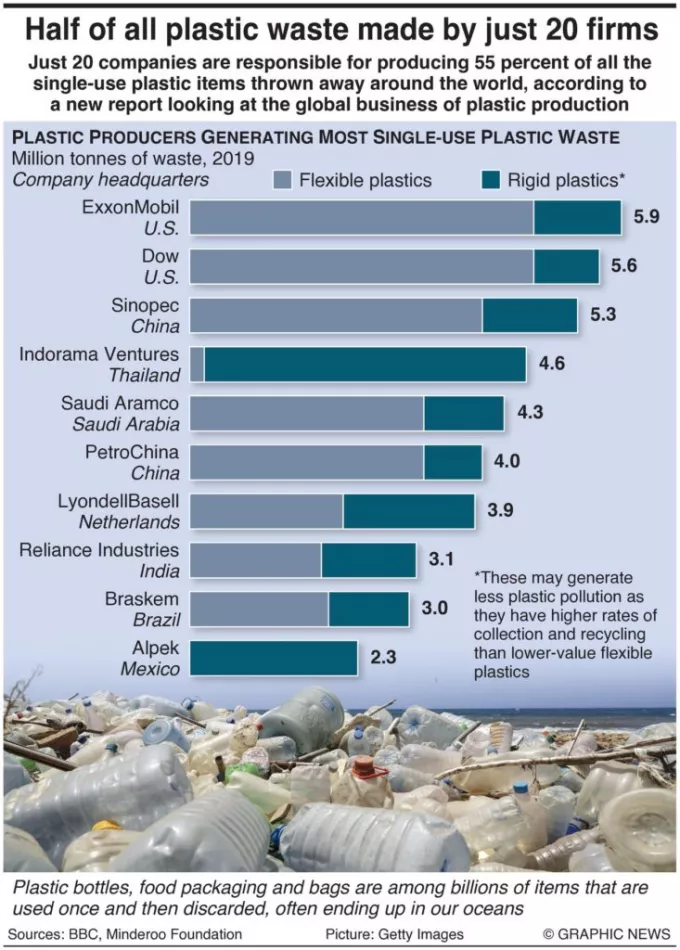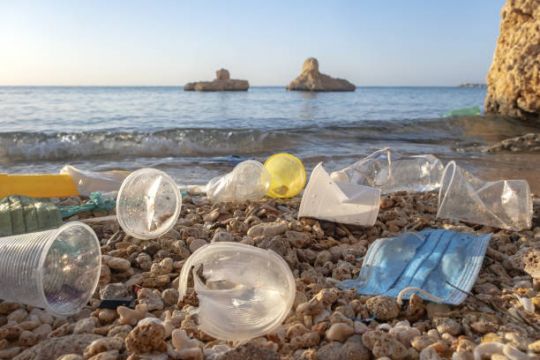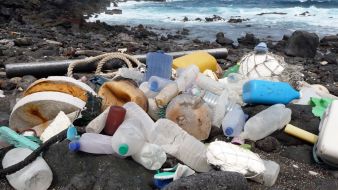Just 20 companies are responsible for producing more than half of all the single-use plastic items thrown away around the world, according to a new report.
The research – carried out by a consortium including the London School of Economics – names 20 petrochemical companies which it says are the source of 55 percent of the world’s single-use plastic waste. The companies include ExxonMobil, Dow and Sinopec.
According to the study, more than 130 million tonnes of single-use plastic was thrown away in 2019, almost all of it burned, buried in landfill or discarded directly into the environment.
Single-use plastics are most likely to end up in our oceans, where they account for almost all visible pollution.
Ocean pollution
Once there, they eventually break down into tiny particles that impact wildlife health – and the ocean’s ability to store carbon, the report said
Production of single-use plastics is also set to grow by 30 per cent in the next five years, fuelling their contribution to global warming and ocean pollution, researchers said on Tuesday.
Single-use plastics - such as face masks, medical equipment, shopping bags, coffee cups and cling film - are made from polymers, which use fossil fuels as a base material.
The index used a range of data sources to track the flow of single-use plastic materials through their life cycle - from polymer form to finished goods to waste - and estimated where they were produced, converted, consumed and disposed of.

Polymer producers
ExxonMobil topped the index of polymer producers generating single-use plastic waste, contributing 5.9 million tonnes in 2019, according to the report developed with energy consultancy Wood Mackenzie.
The firm said in emailed comments it “shares society's concern about plastic waste and agrees it must be addressed”, requiring a collaborative effort between business, governments, green groups and consumers.
It added that it was taking action to address plastic waste by increasing recyclability, backing efforts to recover more plastic waste and working on advanced recycling solutions that could help lower greenhouse gas emissions linked to products.
The report said nearly 60 per cent of the commercial finance for the single-use plastic industry comes from 20 global banks that have loaned almost $30 billion (€24.5 billion) for polymer production since 2011.
Liquid landfill
In a foreword, former U.S. Vice President Al Gore said the climate and plastic waste crises are “increasingly intertwined”, with the atmosphere treated like an “open sewer” for planet-heating emissions and the ocean like a “liquid landfill” for plastic waste.
As the electricity and transport sectors transition to clean energy, the companies that extract and sell fossil fuels are “scrambling to massively expand” their petrochemicals market, three-quarters of which is plastic production, he wrote.
“Since most plastic is made from oil and gas – especially fracked gas – the production and consumption of plastic are becoming a significant driver of the climate crisis, already producing greenhouse gas emissions on the same scale as a large country," he added.
Academic estimates of the carbon footprint of plastics have indicated the whole life cycle of single-use plastics accounted for about 1.5% of global greenhouse gas emissions in 2019, with polymers the main contributor, the report authors said.
On their current growth path, single-use plastics could be responsible for 5-10 per cent of annual greenhouse gas emissions by 2050 if the world meets the Paris Agreement goal of limiting global warming to below 2 degrees Celsius, they added.







